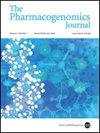The interplay between SLC6A4 and HTR1A genetic variants that may lead to antidepressant failure
IF 2.9
3区 医学
Q2 GENETICS & HEREDITY
引用次数: 0
Abstract
The serotonin transporter (SLC6A4) and the serotonin autoreceptor (HTR1A) are two of the most extensively studied genes in the field of psychiatry, and their variants have been implicated in antidepressant response, specifically with selective serotonin reuptake inhibitors (SSRIs) which are widely regarded as the first-line medications for depression and anxiety. Variants of SLC6A4 and HTR1A have also been studied as risk factors for depression. In this retrospective study, we aim to investigate the relationship between all possible serotonin transporter (SLC6A4) and autoreceptor (HTR1A) variant expression combinations that may have contributed to the therapeutic failure of an SSRI and subsequent disability. In this study, we utilize data from a cohort of 302 European patients diagnosed with depression and/or anxiety who were referred to Personalized Prescribing Inc. (PPI) in 2022 as result of a mental health disability claim to determine whether statistical differences are present in this cohort as compared to general European population allele frequencies. Our data reveals the presence and relevance of significant differences in the presentation of SLC6A4 and HTR1A, specifically in a disability cohort, relative to the average European population. The SLC6A4 gene codes for the serotonin transporter; the SSRI drug target that aims to be blocked to prevent the recycling of serotonin, whereas the HTR1A plays an indirect role as an autoreceptor allowing serotonin levels to be maintained by the SSRI, as well as a direct role in modulating mood through post-synaptic serotonin interaction. This study has revealed statistically significant differences in the expression of these two genes together in increasing the likelihood of drug failure, specifically the presence of one or more G alleles at HTR1A rs6295 in combination with the SLC6A4 SS variant. The most significantly overrepresented combination in this cohort of patients suffering from depression and anxiety that have failed to achieve adequate symptom remission on previous SSRI trials is HTR1A rs6295 GG-SLC6A4 SS which is overrepresented in this study by over 74% at a p-value well below 0.01. Genotyping anti-depressant drug targets may play an important role in optimizing anti-depressant drug response and research developments for future therapies.

SLC6A4和HTR1A基因变异之间的相互作用可能导致抗抑郁药物失败。
5 -羟色胺转运体(SLC6A4)和5 -羟色胺自身受体(HTR1A)是精神病学领域研究最广泛的两个基因,它们的变异与抗抑郁反应有关,特别是选择性5 -羟色胺再摄取抑制剂(SSRIs)被广泛认为是治疗抑郁和焦虑的一线药物。SLC6A4和HTR1A的变异也被研究为抑郁症的危险因素。在这项回顾性研究中,我们旨在调查所有可能的血清素转运体(SLC6A4)和自身受体(HTR1A)变异表达组合之间的关系,这些变异表达组合可能导致SSRI治疗失败和随后的残疾。在这项研究中,我们利用了302名被诊断为抑郁症和/或焦虑症的欧洲患者的队列数据,这些患者在2022年因精神健康残疾索赔而被转介到个性化处方公司(PPI),以确定该队列中与一般欧洲人群等位基因频率相比是否存在统计学差异。我们的数据揭示了SLC6A4和HTR1A表现的显著差异的存在和相关性,特别是在残疾队列中,相对于平均欧洲人群。SLC6A4基因编码血清素转运体;而HTR1A作为一种自身受体发挥间接作用,允许SSRI维持血清素水平,并通过突触后血清素相互作用在调节情绪中起直接作用。本研究显示,这两个基因的表达在增加药物失败的可能性方面存在统计学上的显著差异,特别是在HTR1A rs6295与SLC6A4 SS变体结合时,存在一个或多个G等位基因。在先前的SSRI试验中,患有抑郁和焦虑的患者未能达到足够的症状缓解,在该队列中,最显著的过度代表组合是HTR1A rs6295 GG-SLC6A4 SS,在本研究中,其p值远低于0.01,过度代表超过74%。基因分型抗抑郁药物靶点可能在优化抗抑郁药物反应和未来治疗的研究发展中发挥重要作用。
本文章由计算机程序翻译,如有差异,请以英文原文为准。
求助全文
约1分钟内获得全文
求助全文
来源期刊

Pharmacogenomics Journal
医学-药学
CiteScore
7.20
自引率
0.00%
发文量
35
审稿时长
6-12 weeks
期刊介绍:
The Pharmacogenomics Journal is a print and electronic journal, which is dedicated to the rapid publication of original research on pharmacogenomics and its clinical applications.
Key areas of coverage include:
Personalized medicine
Effects of genetic variability on drug toxicity and efficacy
Identification and functional characterization of polymorphisms relevant to drug action
Pharmacodynamic and pharmacokinetic variations and drug efficacy
Integration of new developments in the genome project and proteomics into clinical medicine, pharmacology, and therapeutics
Clinical applications of genomic science
Identification of novel genomic targets for drug development
Potential benefits of pharmacogenomics.
 求助内容:
求助内容: 应助结果提醒方式:
应助结果提醒方式:


